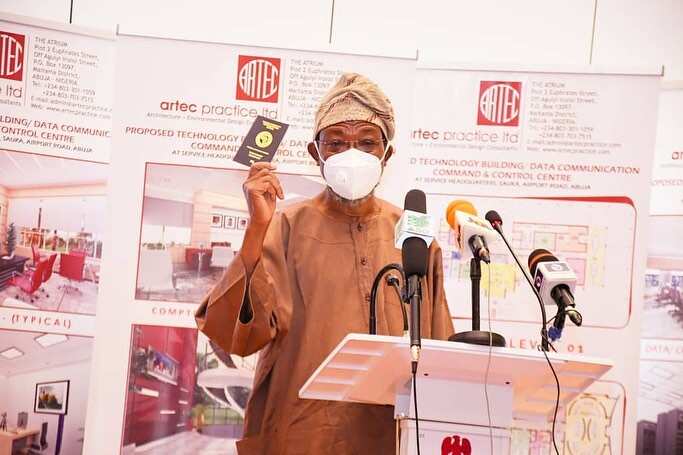Nigeria's e-Temporary Passport: 10 important things to know about new travel document
On Tuesday, March 9, the minister of interior, Rauf Aregbesola, launched the Nigerian Temporary Passport (NTP).
PAY ATTENTION: Join Legit.ng Telegram channel! Never miss important updates!
According to Aregbesola, the passport will address the concerns of Nigerians abroad who have an urgent need to return home as well as those who are being returned home by their host countries but don't have a valid passport.

Source: Facebook
This piece highlights the major things to know about the temporary passport:
1. The temporary passport is designed for a one-way trip to Nigeria only
2. It will be issued to Nigerians to return home in emergency situations in the case of loss or misplacement of their standard passport
3. It officially replaced the paper-based Emergency Travel Certificate
4. The document is issued by the Nigerian embassies and high commissions outside of the country
5. Though it has all the features of the standard passport, travellers cannot use it more than once and it is only valid for 30 days after issuance
6. Just like the standard passport, the NTP meets the International Civil Aviation Organization (ICAO)
7. The e-temporary transport contains an electronic chip inside which has information about the travellers
8. The document does not in any way serve as a replacement for the Nigerian passport.
9. Immigration officers will collect the NTP from travellers after usage (once)
10. The document can be issued to applicants irrespective of age
Why the new passport was introduced
As earlier stated, the e-temporary passport replaced the Paper-type Emergency Travel Certificate (ETC) hitherto issued to Nigerians in Diaspora desirous of returning home but don't have a regular standard passport.
The ETC had acceptance issues as some countries did not recognize it due to its failure to meet international standards.
The Nigeria Immigration Service explained that the ETC was a "big security threat" to Nigeria and the global community because it is just an "ordinary paper" with no security feature inside it.
PAY ATTENTION: Install our latest app for Android, read best news on Nigeria’s #1 news app
Meanwhile, the United Kingdom has announced that international students who want to work in England following the successful completion of a UK degree at bachelor’s degree level or above, or an eligible professional qualification, can now do so.
Nigeria is one of the main countries sending students to the UK, and the numbers have increased in recent years.
The British government said the graduates could look for work after their studies for a maximum period of two years and three years for PhD students.
In other news, President Muhammadu Buhari, Thursday, March 4 directed the Nigeria Immigration Service to improve surveillance and control around Nigerian borders, adding that criminals should be prevented from finding Nigeria as a safe haven to hide and perpetuate their criminality.

Read also
Insecurity: Our best has not proved good enough, Buhari admits, says govt getting desperate
According to a statement seen by Legit.ng and issued by presidential spokesman, Femi Adesina, Buhari gave the directive in his speech at the virtual inauguration of the NIS Technology Building.
Adesina quoted the president as instructing all security agencies to raise their performance in protecting lives and property, with a mandate that the country’s Global Security Index must be improved.
*******
Nurudeen Lawal is a Legit.ng journalist passionate about fact-checking/verification journalism. He holds a Bachelor of Arts degree in Literature-in-English from Obafemi Awolowo University, Ile-Ife, Osun State. As Politics Editor, Nurudeen mostly writes on Nigeria’s political and socio-economic developments. He has attended different workshops, conferences and training on fact-checking and digital reporting, among others. Learn more about him on Twitter, @Nurudeen Lawal_
Source: Legit.ng


